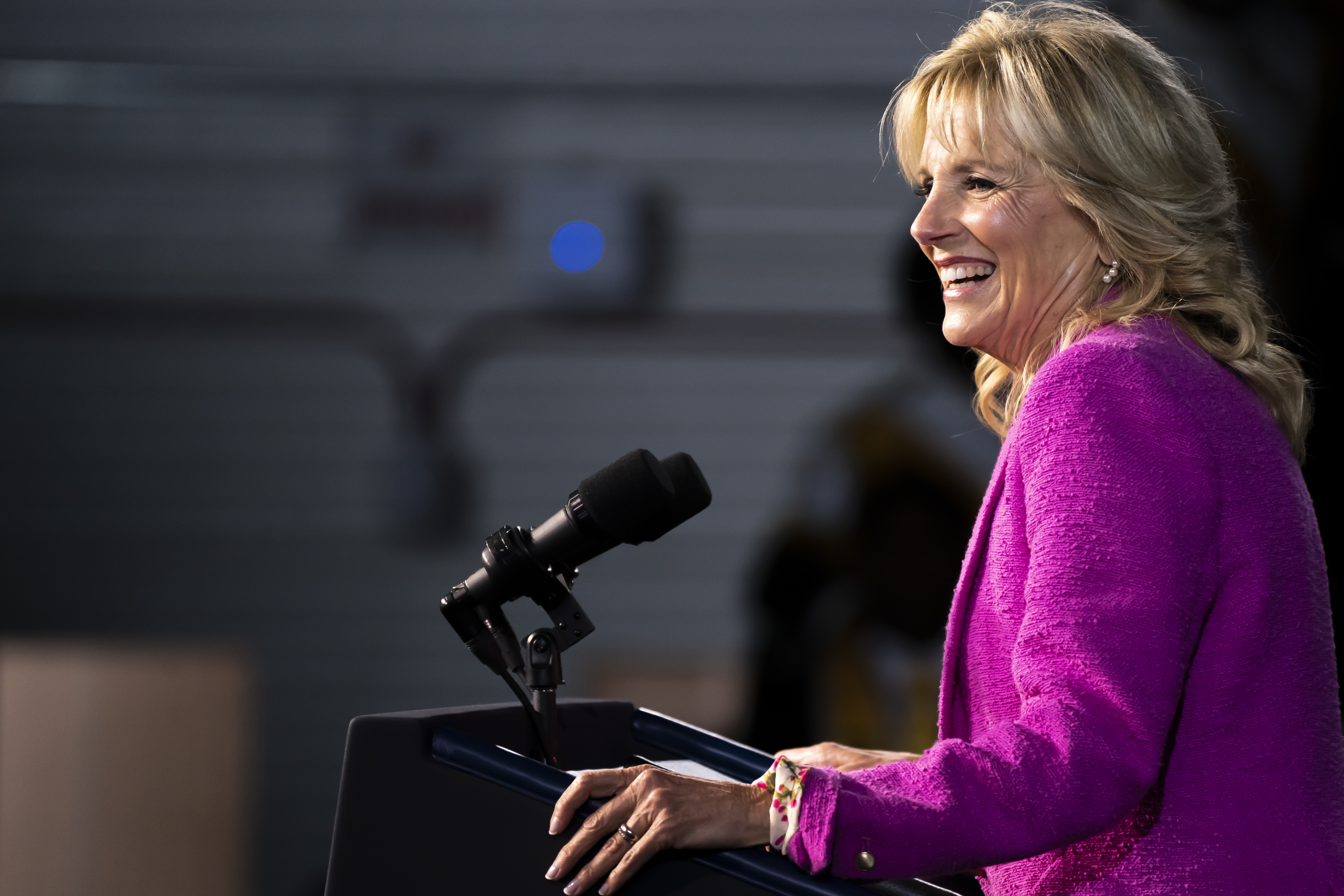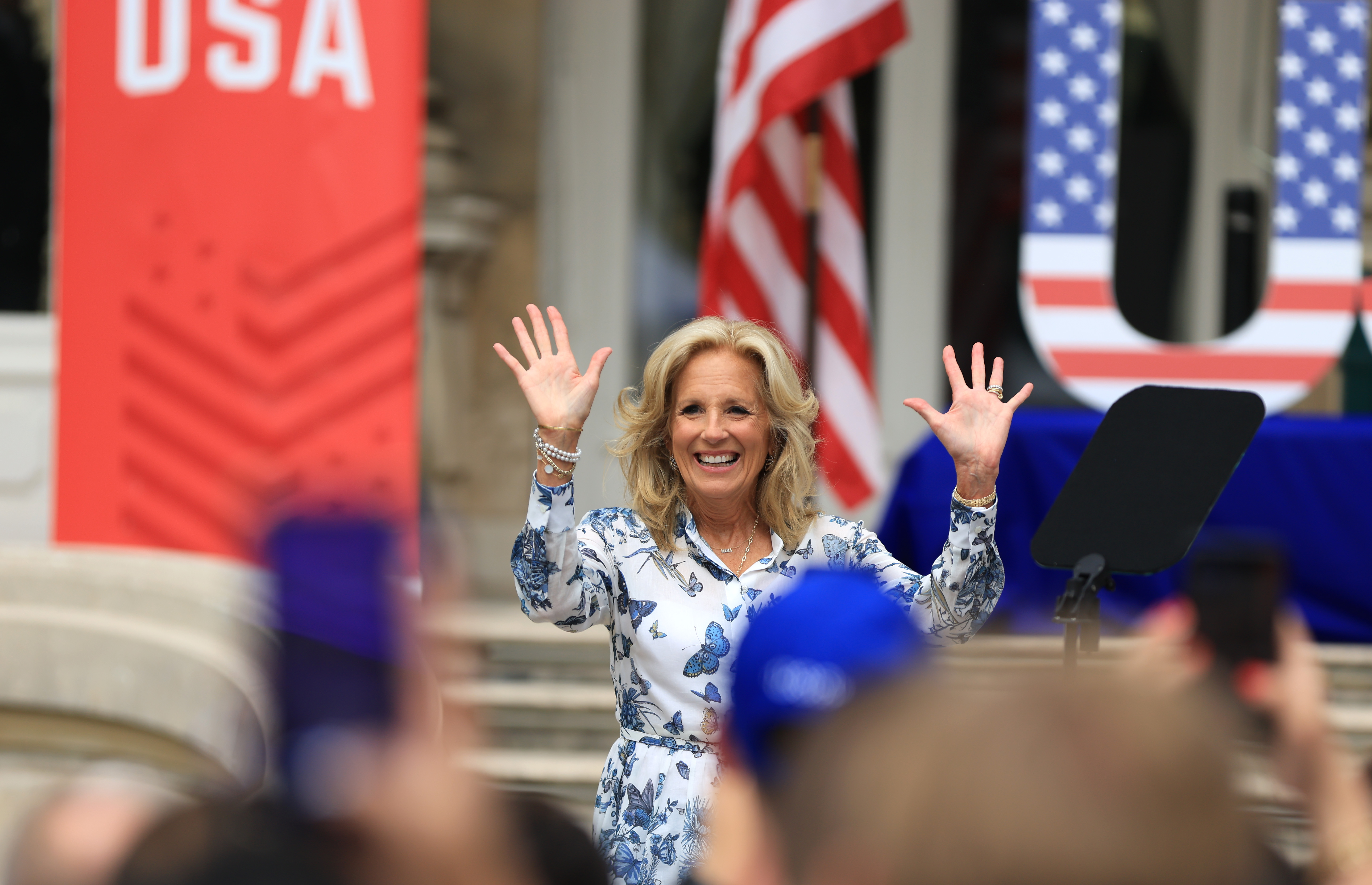
First lady Jill Biden is unveiling a new set of actions to address health inequities faced by women in the United States, plans that include spending at least $500 million annually on women's health research.
Biden was making the announcement Monday while closing out the first day of this year’s Clinton Global Initiative annual meeting in New York.
The additional government spending will mainly come from the Department of Defense, which provides medical care to more than 230,000 active duty military women and nearly 2 million military retirees, as well as their family members. The research will focus on why these women experience endocrine, hematological and other immunity-related disorders twice as often as men.
“Our nation is home to the best health research in the world, yet women’s health is understudied and research is underfunded,” Biden said at a separate event on Friday. “And we still know too little about how to affectively prevent, diagnose, and treat a range of health conditions in women, from heart disease to cancers.”
The commitment was among the largest of the more than 100 expected at the two-day meeting of political, business and philanthropic leaders gathering to address some of the world’s most pressing issues. Former President Bill Clinton, former Secretary of State Hillary Clinton, and Clinton Foundation Vice Chair Chelsea Clinton have set this year’s theme as “What’s Working,” a way to look for potential solutions and effective programs in tumultuous times.
“You don’t look at a problem and say, ‘That’s impossible,” Bill Clinton said in his opening remarks. “You don’t just throw up your hands. You roll up your sleeves.”
An example of that strategy came from the announcement that a wide-ranging group of 15 nonprofits, humanitarian aid organizations and other funders will join forces to address the humanitarian crisis in Sudan following more than a year of conflict.
The Coalition for Mutual Aid in Sudan – which includes The Bill & Melinda Gates Foundation, Global Giving, Global Fund for Women, and The Unitarian Universalist Service Committee — will donate at least $2 million to mutual aid groups in the country by the end of the year. It also pledged to raise another $4.5 million for those groups within the next two years.
Patricia McIlreavy, president of the Center for Disaster Philanthropy, which has been representing the coalition, said that, while much more aid is needed, the collaboration and problem-solving of the group is an important step forward.
Get a weekly recap of the latest San Francisco Bay Area housing news. >Sign up for NBC Bay Area’s Housing Deconstructed newsletter.
“It gets us started,” McIlreavy told The Associated Press. “And it models the behavior you want to see from others. If you wait until it’s the perfect opportunity, you’ve missed many of the opportunities that were good enough.”
World Food Program director Cindy McCain said earlier this month that “Sudan’s nearly a forgotten crisis” and that 25 million people there already face acute hunger. Last week, the top United Nations humanitarian official said fighting is escalating in the conflict that began in April 2023 when long-simmering tensions between Sudan’s military and paramilitary leaders broke out in the capital Khartoum and spread to other regions. The U.N. says more than 14,000 people have been killed and 33,000 injured.
“With ongoing impediments to a large-scale international aid response, Sudanese community groups have become the primary frontline responders and are currently the most effective means of reaching millions on the brink of starvation,” McIlreavy said in a prepared statement on behalf of the coalition. “With so many lives on the line, the imperative to support local aid efforts in Sudan has never been more urgent.”
The Center for Disaster Philanthropy says more than 12 million people have been forced from their homes in Sudan, creating what is now the world’s largest displacement and hunger crisis. The danger from the conflict has prevented most international aid agencies from delivering supplies to those in need.
Greg Milne, the Clinton Global Initiative CEO who convened a panel in April to raise awareness and support for the Sudanese people, said the new coalition is an example of what bringing organizations from varied sectors can do.
“We know strong, diverse partnerships can help address often overlooked and even dire challenges, and develop unexpected and innovative solutions,” he said.
Philanthropic leaders, including Bill Gates, World Central Kitchen founder Jose Andres, Open Society Foundations President Binaifer Nowrojee, and Rockefeller Foundation President Raj Shah will share information about their work during CGI, as will Prince Harry, who will discuss the launch of The Archewell Foundation Parents’ Network, which supports parents of children harmed online. In his Tuesday appearance, the Duke of Sussex will also address his work with the World Health Organization and others to reduce violence against children, an issue he and his wife Meghan outlined on a recent trip to Colombia.
Brazilian President Luiz Inacio Lula da Silva, Barbados Prime Minister Mia Mottley, Kosovo President Vjosa Osmani Sadriu, and Latvian President Edgars Rinkevics are set to address the conference, as are CEOs from Pfizer, Mastercard, IKEA, Pinterest, Sanofi and Chobani.



